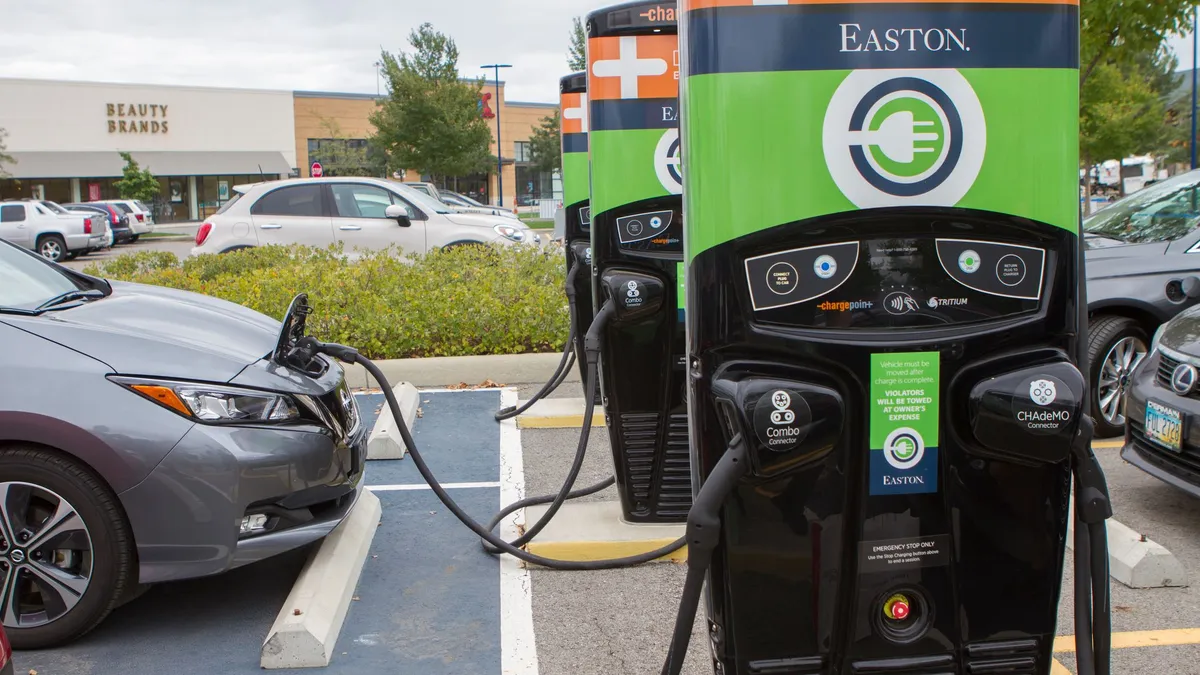Dive Brief:
- With its federal grant funding period now over, the Smart Columbus organization in Columbus, Ohio, announced Tuesday it will continue its work as a "collaborative innovation lab" to use technology to address societal problems in the region.
- Now, the city of Columbus will sustain several of the group's initiatives that had been pioneered after winning the U.S. Department of Transportation's (USDOT) inaugural Smart City Challenge. The projects slated to continue are multimodal trip-planning app Pivot; parking payment app ParkColumbus; smart mobility hubs; the connected vehicle environment; and the Smart Columbus operating system.
- Officials said Smart Columbus will now focus on ways technology can help benefit the region, including through mobility, sustainability and digitalization. Research from Ohio State University found the implementation of USDOT's grant funding generated an estimated gross metropolitan product (GMP) of $173.39 million and generated or induced 2,366 jobs in the city and its surrounding area.
Dive Insight:
Columbus turned heads in 2016 when it beat out more than 70 other cities to win the challenge. In the years since, it has used the $50 million from the federal government and the Paul G. Allen Family Foundation — in addition to $19 million in cost-sharing from the city, state and county — for a wide variety of initiatives and pilot programs. Those have included autonomous shuttles as well as smart mobility hubs, which feature interactive kiosks, pick-up and drop-off points for ride-hailing vehicles and parking for bikes, scooters and more.
Smart Columbus also has pushed locals to adopt electric vehicles, led the charge on corporate decarbonization through its Smart Columbus Energy nonprofit and looked to educate visitors and residents about the future of the city at its Smart Columbus Experience Center.
Mandy Bishop, Smart Columbus program manager for the city of Columbus, said the city was ideally positioned to take advantage of the USDOT grant funding and put effective initiatives in place.
"We weren't starting from scratch," Bishop said. "We were starting from a place with strong infrastructure, we are a place where you test ideas, test technologies. And we have a strong foundation in alignment with those among the public, private and academic and nonprofit sectors… I think the thing that’s really changed is the profile of Columbus and how we're viewed as America's smart city."
The coronavirus pandemic forced a rethink of some of Smart Columbus’ programs and initiatives. For example, its autonomous shuttle service in the Linden neighborhood shifted from transporting people to moving food and medical supplies. And its Pivot app became more geared toward essential workers, who still relied on transit to get to work even as others stayed home. While COVID-19 was the "biggest curveball," programs were already predisposed to evolve, said Jordan Davis, executive director of Smart Columbus.
"I think that the DNA of the program has been to be iterative," Davis said. "Part of what was so special about this challenge-based approach was to enable a community to get close to their problems. They faced these problems and could see what's solvable with technology, and that technology is ever changing, just like the conditions of the world. We pivoted and iterated accordingly."
As for the future, Smart Columbus will continue to iterate and pilot new technology deployments, Davis said, but it will do so while looking to help solve some of the biggest challenges in the city. That could include working to help close the digital divide and connect more people to broadband internet, or integrating micromobility more into the city's transportation network, for example.
USDOT spokespeople did not respond to requests for comment on whether the agency will revive the challenge in the future. But Bishop and Davis both said if it does, the next winning city should focus on harnessing innovation to help society.
"Don't just demonstrate tech for technology's sake and solve the problems in your community leveraging technology and innovation," Bishop said. "You'll be better off for it. And you'll learn some things along the way."
Davis said even without a follow-up challenge, she hopes Columbus could be a model for other cities to follow in their own efforts to face down society's biggest challenges.
"One of the things that we feel really lucky about, that I hope continues, is the cross-city collaboration," she said. "The amount of communities that shared their learnings with us, or have invited us to impart our best practices and lessons learned, has created quite a community of practice across the country. And we're better because of it, and we all have the ability to have resources from others that we're building upon [so we are] not duplicating or reinventing the wheel."












